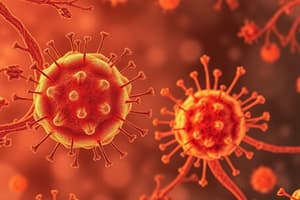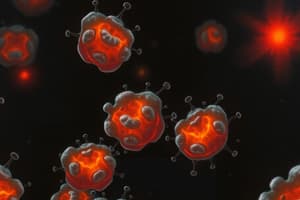Podcast
Questions and Answers
What distinguishes active immunity from passive immunity?
What distinguishes active immunity from passive immunity?
- Active immunity becomes ineffective after a short period.
- Active immunity is acquired through exposure to antigens. (correct)
- Active immunity is solely dependent on maternal antibodies.
- Active immunity involves the direct transfer of antibodies.
Which type of immunity lasts longer and may be lifelong?
Which type of immunity lasts longer and may be lifelong?
- Artificially acquired active immunity
- Naturally acquired passive immunity
- Naturally acquired active immunity (correct)
- Artificially acquired passive immunity
What is the primary role of activated T cells in cell-mediated immunity?
What is the primary role of activated T cells in cell-mediated immunity?
- To directly attack abnormal cells and pathogens. (correct)
- To neutralize antigens in breast milk.
- To produce antibodies in body fluids.
- To transfer antibodies from mother to infant.
Which of the following best describes immunocompetence?
Which of the following best describes immunocompetence?
Which statement accurately describes antibody-mediated immunity?
Which statement accurately describes antibody-mediated immunity?
Flashcards
Adaptive Immunity
Adaptive Immunity
Acquired after birth, using specific defenses to fight antigens.
Active Immunity
Active Immunity
Immune response develops from exposure. Long-lasting.
Passive Immunity
Passive Immunity
Antibodies from another source provide temporary protection.
Cell-mediated Immunity
Cell-mediated Immunity
Signup and view all the flashcards
Antibody-mediated Immunity
Antibody-mediated Immunity
Signup and view all the flashcards
Study Notes
Adaptive Immune System
- Acquired after birth
- Longer-lasting, potentially lifelong response to antigens
- Two types of adaptive immunity:
- Active Immunity:
- Develops after exposure to antigens
- Natural: Exposure to pathogens (e.g., chickenpox)
- Artificial: Vaccination
- Passive Immunity:
- Antibodies from another source
- Natural: Breast milk
- Artificial: Antibody injection (e.g., anti-venom)
- Active Immunity:
Cell-Mediated Immunity
- T cells directly attack abnormal cells and pathogens
- T cells are stimulated by antigens on cell surfaces
- Phagocytosis involves cells engulfing and destroying pathogens
- T cells stimulate the activity of B cells
Antibody-Mediated Immunity
- B cells differentiate into plasma cells
- Plasma cells produce antibodies
- Antibodies target antigens in body fluids
- Antibodies also defend against pathogens
Immunocompetence
- Ability to mount an immune response after antigen exposure
Studying That Suits You
Use AI to generate personalized quizzes and flashcards to suit your learning preferences.




